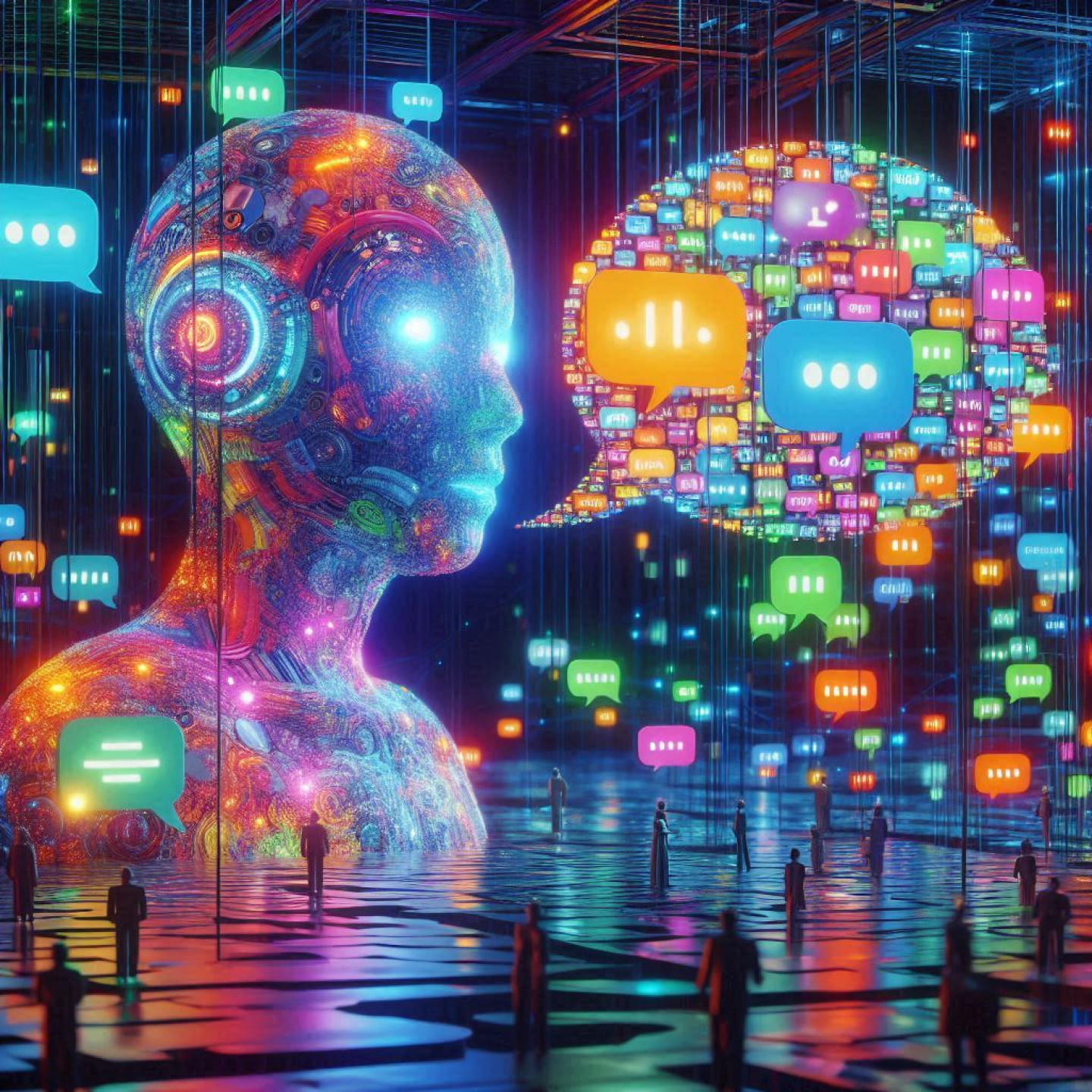The AI Revolution
6 Ways AI is Transforming Translation Services
6 Ways AI is Transforming Translation Services
In today's globalized world, communication knows no boundaries. With businesses extending their reach internationally and individuals fostering connections across diverse cultures, there has been a notable surge in the need for translation services. However, the current challenge lies in meeting this demand efficiently and accurately while navigating through varying linguistic nuances and cultural sensitivities. To overcome this hurdle, advancements in Artificial Intelligence (AI) have paved the way for innovative solutions that streamline translation processes, ensuring swift and precise communication across linguistic divides. Let's dive in!
Discover 6 ways AI is transforming translation services
AI is revolutionizing how we gather information and synthesize it into new creations, fundamentally reshaping the landscape of innovation. In this article, we will explore six key ways AI is transforming translation services to meet tomorrow's global challenges, offering exceptional opportunities for efficiency, accuracy, and cross-cultural communication.
-
Enhanced efficiency and speed
-
Improved accuracy and consistency
-
Customization and adaptability
-
Multilingual content management
-
Cost-effectiveness and scalability
-
Ethical and regulatory considerations
1. Enhanced efficiency and speed
AI-powered tools have significantly expedited the translation process, gone are the days of waiting around for translations to trickle in. With machine learning algorithms and neural networks, these systems can analyze vast amounts of data and learn from previous translations to generate more accurate results in a fraction of the time. What used to take days or weeks can now be accomplished in minutes, enabling businesses to meet tight deadlines and respond promptly to market demands.
2. Improved accuracy and consistency
One of the key benefits of AI in translation is its ability to ensure greater accuracy and consistency in language output. Say goodbye to those pesky typos and mistranslations, since unlike human translators, our AI buddies don't mess around regarding accuracy, not succumb to fatigue, emotions, or subjective interpretations. They adhere strictly to predefined rules and linguistic patterns, minimizing errors and inconsistencies across translations. This reliability is particularly crucial in industries where precision and clarity are paramount, such as legal, medical, and technical fields.
However, while AI-driven translation offers unmatched efficiency, the human touch remains indispensable. That's where the professionals at The Words Lab shine, offering flawless editing and proofreading services to ensure your content is polished to perfection.
3. Customization and adaptability
AI-driven translation platforms offer unparalleled customization options, allowing users to tailor translations to specific contexts, industries, or target audiences. Advanced algorithms can analyze content nuances, identify relevant terminology, and adapt language style to match brand voice and cultural preferences. Moreover, these systems continuously learn and evolve based on user feedback, ensuring ongoing optimization and adaptation to changing linguistic trends and preferences.
4. Multilingual content management
We know that managing multilingual content can be a headache, especially with the exponential growth of the digital industry. However, AI-powered translation solutions optimize this procedure by seamlessly integrating with various digital platforms. For instance, WordPress is a popular choice for content management systems (CMS), offering robust translation capabilities. Organizations can also leverage e-commerce platforms like Shopify, which facilitate smooth translation processes. Additionally, social media channels such as Twitter and Facebook provide opportunities for reaching global audiences with localized content. Through automated workflows and API integrations, businesses can translate and localize content in real-time, ensuring greater agility and efficiency. With these tools at your disposal, it's like having the whole world in the palm of your hand, enabling you to connect with audiences worldwide with just the touch of a finger.
5. Cost-effectiveness and scalability
Who said quality translations have to break the bank? AI-driven translation services offer a cost-effective alternative to traditional translation methods, particularly for high-volume, repetitive tasks. By automating routine translation tasks, businesses can significantly reduce labor costs and operational overheads while maintaining quality and consistency. Furthermore, AI solutions are highly scalable and capable of handling large volumes of content without compromising speed or accuracy. This scalability makes them ideal for businesses of all sizes, from startups to multinational corporations. Looking for reliable and efficient translation services? Explore the comprehensive offerings of The Words Lab's translation services today.
6. Ethical and regulatory considerations
While AI brings unprecedented opportunities to the translation industry, it also raises ethical and regulatory concerns. Paramount considerations such as privacy, data security, and intellectual property rights come to the forefront, particularly when handling sensitive or confidential information. Additionally, ensuring AI algorithms remain unbiased and culturally sensitive is essential to maintaining trust and credibility in diverse global markets. Transparency and accountability in AI development and deployment are critical to address these concerns and foster responsible AI adoption.
Looking to integrate AI into your translation strategy while retaining the human touch? Excellent options like ChatGPT or Copilot exist in the market, but remember, they're like clockwork engines that need supervision and even calibration to work smoothly.
The final word
In conclusion, AI is revolutionizing the translation services industry, empowering businesses to communicate effectively across languages and cultures. While AI plays a pivotal role in this transformation, it is important to recognize the irreplaceable value of human expertise in refining translations for accuracy and cultural relevance. AIs are our friends, but we need to "keep an eye" on them.
Contact us today to learn how we can help you leverage the power of AI for your translation needs. As we embrace the future of translation, it is essential to navigate these changes thoughtfully, ethically, and responsibly, ensuring that AI catalyzes positive change in our interconnected world. Cheers to the future – it's looking brighter than ever!
For a deeper understanding of AI's influence on translation services, browse through our blog section for related articles. Take the next step towards embracing AI in your translation strategy and unlock new opportunities for global growth and innovation. Elevate your content with AI copy-editing services offered by The Words Lab, guaranteeing impeccably refined text.
In today's globalized world, communication knows no boundaries. With businesses extending their reach internationally and individuals fostering connections across diverse cultures, there has been a notable surge in the need for translation services. However, the current challenge lies in meeting this demand efficiently and accurately while navigating through varying linguistic nuances and cultural sensitivities. To overcome this hurdle, advancements in Artificial Intelligence (AI) have paved the way for innovative solutions that streamline translation processes, ensuring swift and precise communication across linguistic divides. Let's dive in!
Discover 6 ways AI is transforming translation services
AI is revolutionizing how we gather information and synthesize it into new creations, fundamentally reshaping the landscape of innovation. In this article, we will explore six key ways AI is transforming translation services to meet tomorrow's global challenges, offering exceptional opportunities for efficiency, accuracy, and cross-cultural communication.
-
Enhanced efficiency and speed
-
Improved accuracy and consistency
-
Customization and adaptability
-
Multilingual content management
-
Cost-effectiveness and scalability
-
Ethical and regulatory considerations
1. Enhanced efficiency and speed
AI-powered tools have significantly expedited the translation process, gone are the days of waiting around for translations to trickle in. With machine learning algorithms and neural networks, these systems can analyze vast amounts of data and learn from previous translations to generate more accurate results in a fraction of the time. What used to take days or weeks can now be accomplished in minutes, enabling businesses to meet tight deadlines and respond promptly to market demands.
2. Improved accuracy and consistency
One of the key benefits of AI in translation is its ability to ensure greater accuracy and consistency in language output. Say goodbye to those pesky typos and mistranslations, since unlike human translators, our AI buddies don't mess around regarding accuracy, not succumb to fatigue, emotions, or subjective interpretations. They adhere strictly to predefined rules and linguistic patterns, minimizing errors and inconsistencies across translations. This reliability is particularly crucial in industries where precision and clarity are paramount, such as legal, medical, and technical fields.
However, while AI-driven translation offers unmatched efficiency, the human touch remains indispensable. That's where the professionals at The Words Lab shine, offering flawless editing and proofreading services to ensure your content is polished to perfection.
3. Customization and adaptability
AI-driven translation platforms offer unparalleled customization options, allowing users to tailor translations to specific contexts, industries, or target audiences. Advanced algorithms can analyze content nuances, identify relevant terminology, and adapt language style to match brand voice and cultural preferences. Moreover, these systems continuously learn and evolve based on user feedback, ensuring ongoing optimization and adaptation to changing linguistic trends and preferences.
4. Multilingual content management
We know that managing multilingual content can be a headache, especially with the exponential growth of the digital industry. However, AI-powered translation solutions optimize this procedure by seamlessly integrating with various digital platforms. For instance, WordPress is a popular choice for content management systems (CMS), offering robust translation capabilities. Organizations can also leverage e-commerce platforms like Shopify, which facilitate smooth translation processes. Additionally, social media channels such as Twitter and Facebook provide opportunities for reaching global audiences with localized content. Through automated workflows and API integrations, businesses can translate and localize content in real-time, ensuring greater agility and efficiency. With these tools at your disposal, it's like having the whole world in the palm of your hand, enabling you to connect with audiences worldwide with just the touch of a finger.
5. Cost-effectiveness and scalability
Who said quality translations have to break the bank? AI-driven translation services offer a cost-effective alternative to traditional translation methods, particularly for high-volume, repetitive tasks. By automating routine translation tasks, businesses can significantly reduce labor costs and operational overheads while maintaining quality and consistency. Furthermore, AI solutions are highly scalable and capable of handling large volumes of content without compromising speed or accuracy. This scalability makes them ideal for businesses of all sizes, from startups to multinational corporations. Looking for reliable and efficient translation services? Explore the comprehensive offerings of The Words Lab's translation services today.
6. Ethical and regulatory considerations
While AI brings unprecedented opportunities to the translation industry, it also raises ethical and regulatory concerns. Paramount considerations such as privacy, data security, and intellectual property rights come to the forefront, particularly when handling sensitive or confidential information. Additionally, ensuring AI algorithms remain unbiased and culturally sensitive is essential to maintaining trust and credibility in diverse global markets. Transparency and accountability in AI development and deployment are critical to address these concerns and foster responsible AI adoption.
Looking to integrate AI into your translation strategy while retaining the human touch? Excellent options like ChatGPT or Copilot exist in the market, but remember, they're like clockwork engines that need supervision and even calibration to work smoothly.


Recent Comments